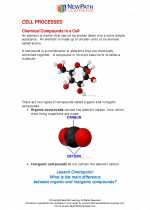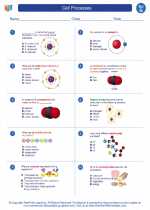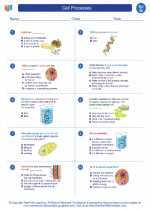Enzymes
An enzyme is a type of protein that acts as a biological catalyst, speeding up chemical reactions in living organisms without being consumed in the process. Enzymes are crucial for the functioning of cells and are involved in various metabolic processes such as digestion, respiration, and synthesis of new molecules.
Structure of Enzymes:
Enzymes are typically large, complex proteins that are made up of long chains of amino acids. They have a specific three-dimensional shape that allows them to interact with specific molecules, known as substrates, to catalyze a particular chemical reaction.
Function of Enzymes:
Enzymes work by lowering the activation energy required for a chemical reaction to occur, thus speeding up the rate of the reaction. They achieve this by bringing the substrates together in the correct orientation and providing an environment conducive to the reaction.
Factors Affecting Enzyme Activity:
Several factors can affect the activity of enzymes, including temperature, pH, substrate concentration, and the presence of inhibitors or activators. For example, extreme temperatures or pH levels can denature an enzyme, rendering it inactive.
Enzyme Classification:
Enzymes are classified into several categories based on the type of reaction they catalyze. These include hydrolases, isomerases, ligases, lyases, oxidoreductases, and transferases, each of which facilitates a specific type of chemical transformation.
Study Guide:
- What is the function of an enzyme in a biological system?
- Describe the structure of an enzyme and how it interacts with substrates.
- Explain the factors that can affect enzyme activity and provide examples of each.
- Classify enzymes based on the type of reaction they catalyze and provide an example of each type.
- Discuss the importance of enzymes in various metabolic processes within the body.
Understanding the role of enzymes and their significance in biological processes is crucial for comprehending various aspects of biochemistry and physiology. Mastery of this topic will enhance your understanding of how living organisms function at the molecular level.
.◂Science Worksheets and Study Guides Seventh Grade. Cell Processes

 Activity Lesson
Activity Lesson
 Worksheet/Answer key
Worksheet/Answer key
 Worksheet/Answer key
Worksheet/Answer key
 Worksheet/Answer key
Worksheet/Answer key
 Worksheet/Answer key
Worksheet/Answer key
 Vocabulary/Answer key
Vocabulary/Answer key
 Vocabulary/Answer key
Vocabulary/Answer key
 Vocabulary/Answer key
Vocabulary/Answer key
 Vocabulary/Answer key
Vocabulary/Answer key
 Vocabulary/Answer key
Vocabulary/Answer key
 Vocabulary/Answer key
Vocabulary/Answer key
 Vocabulary/Answer key
Vocabulary/Answer key
